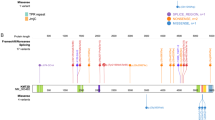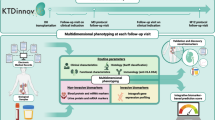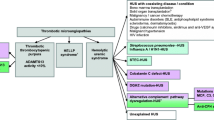Abstract
Background
We evaluated the impact of persistent preformed donor-specific antibody (DSA) and de novo DSA (dnDSA) detected at 1 year posttransplantation on long-term death-censored graft survival.
Methods
One hundred and sixty adult patients who received living kidney allograft with pretransplant-negative T-cell complement-dependent cytotoxicity crossmatch (CDCXM), and without periodic screening for DSA, were eligible for this study. All enrolled patients were retrospectively tested for DSA using the Luminex assay. The presence of DSA was analyzed in stored serum samples collected at 1 year posttransplantation. If the recipients had DSA, it was analyzed in the pretransplant serum sample. The detection of DSA solely in the 1 year posttransplant sample was defined as dnDSA, and DSA detection in both pretransplant and 1 year posttransplant samples was defined as persistent preformed DSA.
Results
DSAs were identified in 14 (8.8%) of the 160 patients. Seven patients had persistent preformed DSA, 6 had dnDSA, and 1 had both persistent preformed and dnDSA at 1 year posttransplantation. Death-censored allograft survival rates of patients with DSA versus those without DSA at 7 and 11 years were 77.9 vs. 97.8% and 60.6 vs. 89.2%, respectively. The graft survival rate was lower in patients with persistent preformed DSA and/or dnDSA. Each case of preformed DSA and dnDSA was associated with long-term graft survival.
Conclusion
The presence of persistent preformed DSA or dnDSA at 1 year posttransplantation may be a predictor of long-term graft survival. Further study is needed to evaluate whether periodic screening for DSA improves long-term graft survival.




Similar content being viewed by others
References
Lefaucheur C, Loupy A, Hill GS, Adrade J, Nochy D, Antoine C, et al. Preexisting donor-specific HLA antibodies predict outcome in kidney. Transplant J Am Soc Nephrol. 2010;21:1398–406.
Wiebe C, Gibson IW, Blydt-Hansen TD, Karpinski M, Ho J, Storsley LJ, et al. Evolution and clinical pathologic correlations of de novo donor-specific HLA antibody post kidney transplant. Am J Transplant. 2012;12:1157–67.
Dunn TB, Noreen H, Gillingham K, Maurer D, Goruroglu Ozturk O, Pruett TL, et al. Revisiting tranditional risk factors for rejection and graft loss after kidney transplantation. Am J Transplant. 2011;11:2132–43.
Lobashevsky A, Goggins W, Rosner K, Taber T. Immunogenicity of Class I HLA but not preformed low MFI donor specific antibodies correlates with outcomes after first renal transplantation. Transpl Immunol. 2017;43–44:42–8.
Adebiyi OO, Gralla J, Klem P, Freed B, Davis S, Wiseman AC, et al. Clinical significance of pretransplant donor-specific antibodies in the setting of negative cell-based flow cytometry crossmatching in kidney transplant recipients. Am J Transplant. 2016;16:3458–67.
Amico P, Honger G, Mayr M, Steiger J, Hopfer H, Schaub S. Clinical relevance of pretransplant donor-specific HLA antibodies detected by single-antigen beads. Transplantation. 2009;87:1681–8.
Kiberd BA, Miller A, Martin S, Tennankore KK. De novo donor-specific human leukocyte antigen antibody screening in kidney transplant recipients after the first year posttransplantation: a medical decision analysis. Am J Transplant. 2016;16:3212–9.
Morath M, Opelz G, Zeier M, Susal C. Clinical relevance of HLA antibody monitoring after kidney transplantation. J Immunol Res. 2014. https://doi.org/10.1155/2014/845040.
Aubert O, Loupy A, Hidalgo L, van Huyen JD, Higgins S, Viglietti D, et al. Antibody-mediated rejection due to preexisting versus de novo donor-specific antibodies in kidney allograft recipients. J Am Soc Nephrol. 2017;28:1912–23.
Amrouche L, Aubert O, Suberbielle C, Rabant M, van Huyen JD, Martienz F, et al. Long-term outcomes of kidney transplantation in patients with high levels of preformed DSA: the necker high-risk transplant program. Transplantation. 2017;101:2440–8.
de Sousa MV, Goncalez AC, Zollner RL, Mazzali M. Effect of preformed or de novo anti-HLA antibodies on function and graft survival in kidney transplant recipients. Ann Transplant. 2018;23:457–66.
Riethmuller S, Ferrari-Lacraz S, Muller MK, Raptis DA, Hadaya K, Rusi B, et al. Donor-specific antibody levels and three generations of crossmatches to predict antibody-mediated rejection in kidney transplantation. Transplantation. 2010;90:160–7.
Kwon H, Kim YH, Choi JY, Shin S, Jung JH, Park SK, et al. Impact of pretransplant donor-specific antibodies on kidney allograft recipients with negative flow cytometry cross-matches. Clin Transplant. 2018;32:e13266.
Zecher D, Bach C, Preiss A, Staudner C, Utpatel K, Evert M, et al. Analysis of luminex-based algorithms to define unacceptable HLA antibodies in CDC-crossmatch negative kidney transplant recipients. Transplantation. 2018;102:969–77.
Loupy A, Lefaucheur C, Vernerey D, Prugger C, van Huyen JD, Mooney N, et al. Complement-biding anti-HLA antibodies and kidney-allograft survival. N Engl J Med. 2013;369:1215–26.
Wiebe C, Gareau AJ, Pochinco DP, Gibson IW, Ho J, Birk PE, et al. Evaluation of C1q status and titer of de novo donor-specific antibodies as predictors of allograft survival. Am J Transplant. 2017;17:703–11.
Moktefi A, Parisot J, Desvaux D, Canoui-Poitrine F, Brocheriou I, Peltier J, et al. C1q binding is not an independent risk factor for kidney allograft loss after an acute antibody-mediated rejection episode: a retrospective cohort study. Transpl Int. 2016;30:277–87.
Racusen LC, Solez K, Colvin RB, Bonsib SM, Castro MC, Cavallo T, et al. The Banff 97 working classification of renal allograft pathology. Kidney Int. 1999;55:713–23.
Solez K, Colvin RB, Racusen LC, Haas M, Sis B, Mengel M, et al. Banff 07 classification of renal allograft pathology: updates and future directions. Am J Transplant. 2008;8:753–60.
Malheiro J, Tafulo S, Dias L, Martins LS, Fonseca I, Beirao I, et al. Analysis of preformed donor-specific anti-HLA antibodies characteristics for prediction of antibody-mediated rejection in kidney transplantation. Transpl Immunol. 2015;32:66–71.
Heilman RL, Nijim A, Desmarteau YM, Khamash H, Pando MJ, Smith ML, et al. De novo donor-specific human leukocyte antigen antibodies early after kidney transplantation. Transplantation. 2014;98:1310–5.
Caillard S, Becmeur C, Gautier-Vargas G, Olagne J, Muller C, Cognard N, et al. Pre-existing donor-specific antibodies are detrimental to kidney allograft only when persistent after transplantation. Transplant Int. 2017;30:29–40.
Kauke T, Oberhauser C, Lin V, Coenen M, Fischereder M, Dick A, et al. De novo donor-specific anti-HLA antibodies after kidney transplantation are associated with impaired graft outcome independently of their C1q-biding ability. Transplant Int. 2017;30:360–70.
Kamburova EG, Wisse BW, Joosten I, Allebes WA, van der Meer A, Hilbrands LB, et al. Pretransplant C3d-fixing donor-specific anti-HLA antibodies are not associated with increased risk for kidney graft failure. J Am Soc Nephrol. 2018;29:2279–85.
Ramon D, Huang Y, Zhao L, Rendulic T, Park JM, Sung RS, et al. Use of complement biding assays to assess the efficacy of antibody mediated rejection therapy and prediction of graft survival in kidney transplantation. Hum Imunol. 2017;78:57–63.
Bailly E, Anglicheau D, Blancho G, Gatault P, Vuiblet V, Chatelet V, et al. Prognostic value of the persistence of C1q-biding anti-HLA antibodies in acute antibody-mediated rejection in kidney transplantation. Transplantation. 2018;102:688–98.
Ponsirenas RVG, Cazarote HB, Araujo SA, Wanderley DC, Shmakura S, Valdameri JS, et al. Anti-HLA donor-specific IgG subclasses and C1q-biding evolution in posttransplant monitoring. Transplant Direct. 2018;4:e385.
Lan JH, Gjertson D, Zheng Y, Clark S, Reed EF, Cecka MJ. Clinical utility of complement-dependent C3d assay in kidney recipients presenting with late allograft dysfunction. Am J Transplant. 2018. https://doi.org/10.1111/ajt.14871.
Buttigieg J, Ali H, Sharma A, Halawa A. Positive Luminex and negative flow cytometry in kidney transplantation: a systematic review and mata-analysis. Nephrol Dial Transplant 2018. https://doi.org/10.1093/ndt/gfy349.
Viglietti D, Loupy A, Vernerey D, Bentlejewski C, Gosset C, Aubert O, et al. Value of donor-specific anti-HLA antibody monitoring and characterization for risk stratification of kidney allograft loss. J Am Soc Nephrol. 2017;28:702–15.
Acknowledgments
This work was partly supported by Grants (Nos.15K18915 and 17K16773) from the Japan Society for the Promotion of Science, Tokyo, Japan.
Funding
This work was partly supported by Grants (15K18915, and 17K16773) from the Japan Society for the Promotion of Science, Tokyo, Japan.
Author information
Authors and Affiliations
Corresponding author
Ethics declarations
Conflicts of interest
The authors declare no conflicts of interest.
Ethical approval
We obtained appropriate Institutional Review Board approval (IRB approval number: 2147).
Additional information
Publisher's Note
Springer Nature remains neutral with regard to jurisdictional claims in published maps and institutional affiliations.
About this article
Cite this article
Fujiyama, N., Satoh, S., Saito, M. et al. Impact of persistent preformed and de novo donor-specific antibodies detected at 1 year after kidney transplantation on long-term graft survival in Japan: a retrospective study. Clin Exp Nephrol 23, 1398–1406 (2019). https://doi.org/10.1007/s10157-019-01780-z
Received:
Accepted:
Published:
Issue Date:
DOI: https://doi.org/10.1007/s10157-019-01780-z




